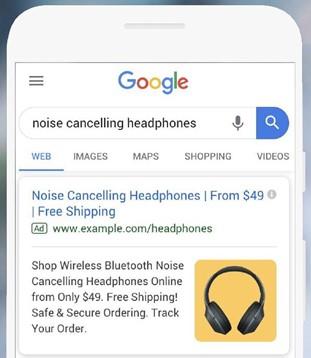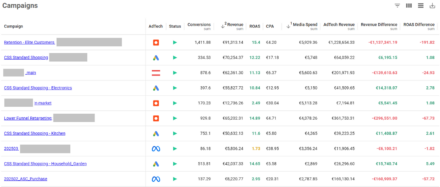Paid Media Updates You Need To Know | August 2021

It’s been a whirlwind month of updates in the paid media world, with changes to match types in paid search, increased taxes, smart bidding simplification, and plenty more.
We explain what these changes mean to you and provide advice on handling these changes.
Digital Service Tax Rolls Out To More Countries
Digital Service Tax (DST) was introduced in the UK, Turkey, and Austria back in November 2020. Since then, we’ve gradually got used to accounting for DST (2% in UK, 5% Turkey and Austria) within media budgets.
Starting from 1st October 2021 Google will be passing on DST to ads served in France, India, Italy, and Spain.
Why we care?
DST is already ingrained in any UK PPC activity budgets, with most paid search plans accounting for this. DST is added on at the end as 2% of the total spend within a month making it straightforward to plan for.
Advertisers and clients should be aware that DST surcharges are charged in addition to account budgets, and accumulated in final invoices.
What to do?
If you run PPC activity in any of the affected countries, you should:
- Prepare and plan paid search budgets in affected regions now.
- Add custom columns into your reporting metrics to account for additional tax on performance metrics such as CPA or ROI.
- Be aware of additional tax when planning activity for new regions.
Google Image Extensions Show Uplift in CTR%

In March 2020 Google began rolling out image extensions on search ads, which means a small thumbnail image can show up next to your text ad.
We’ve been seeing these more across a variety of search terms now, and it appears these are becoming more widely available for search ads with the introduction of dynamic image extensions.
This addition allows Google to automatically pull in relevant images from your site.
Why we care?
Any additional impact on search ads is a good thing. We have been testing this new feature on a US-based paid search account and have observed increases of up to 85% in click through rates compared to normal text ads when using image extensions.
If you’ve been in the PPC world for any length of time, you’ll have seen image extensions come and go as Google tests and then removes them. For now, this looks like it’s here to stay, and for some accounts this could really help drive increased engagement on your ads.
What to do?
- Check in Ads & Extensions whether your account is eligible to add image extensions to ads.
- Talk to your Google Rep (or QueryClick) about the best approach to utilising image extensions on your ads.
- Ensure you own rights to images on your site. Also, if using dynamic image extension, check that any images are relevant and optimised to allow Google to pull them through.
Smart Bidding Strategies Have Changed
Bid strategies have become the mainstay of many ROI focussed PPC ad accounts these days. We are all used to having the option of improving our performance with strategies such as Target CPA or Target ROAS.
Well, Google has announced that they are simplifying the smart bidding options available to advertisers.
Within the next few weeks, Google will be removing the option to use Target CPA and Target ROAS bid strategies within an account. Instead, they have merged old bid strategies into new ‘Maximise Conversion’ strategies using controls to set CPA and ROAS.
| Performance goal | Old Bid Strategy | Updated Bid Strategy |
| Maximize conversions within a set budget | Maximize conversions | Maximize conversions (no target CPA specified) |
| Maximize conversions to a target CPA | Target CPA | Maximize conversions using a target CPA |
| Maximize conversion value within a set budget | Maximize conversion value | Maximize conversion value (no target ROAS specified) |
| Maximize conversion value to a target ROAS | Target ROAS | Maximize conversion value using a target ROAS |
Why we care?
Although there are no major changes to the way the bidding algorithms work in the background, advertisers need to get used to utilising the new bid strategies and use the correct strategy for their objectives.
The Maximise Conversion bid strategy has generally had a negative reputation in the past, with most advertisers favouring a more controllable Target ROAS strategy.
So, with the change to maximise conversions we will closely monitor the performance impact of using these new bid strategies.
What to do?
- Audit your ad account and understand where you are currently using Target bid strategies.
- Prepare and change to the correct bidding strategy, and ensure you set a control. E.g. if you were using Target ROAS shift to Maximise Conversions and set an appropriate ROAS control.
- Monitor and review the past and present performance to determine if the bid strategy is still effective after the changes.
Three Strikes & You’re Out!
Less entertaining but equally good to know, Google are introducing a new violation policy with a three strike approach coming in which can ultimately result in account suspension.
It will apply to three categories:
- Enabling Dishonest Behaviour
- Unapproved Substances
- Dangerous Products or Services.
Essentially if ads are uploaded that go against the category policies you will receive a strike. However, if you then appeal these ads and it has been wrongfully flagged the strike will be removed.
The first strike will cause the account to be placed on hold for 3 days. After the second strike the on hold period will be 7 days and then completely after the third. The strikes last for 90 days so assuming your third strike is wiped your account should become un-suspended. It’s definitely one to keep an eye on as they may roll this out for other categories in the future!
In addition to this, the following verticals have been banned from using YouTube mastheads:
- Alcohol
- Gambling
- Prescription Drugs
- Election/Political ads.
Why we care?
Policy violations are common within Google Ads and can be unintended in the majority of cases. It’s important to monitor the health of your account and make sure there are no policy violations that are going under the radar that could ultimately result in a full account suspension.
What to do?
- Audit your ad account and identify any disapprovals and policy violations.
- Regularly check your ad account (once a week) for any anomalies or policy violation issues.
Looking for a Paid Media specialist?
Find out how we can help you improve your ROI
Own your marketing data & simplify your tech stack.
Have you read?
Chrome’s announcement on dropping cookie opt-in last month closed the door on a 5 year saga for marketers. But what is the landscape like in 2025 for cookie-based measurement?
Generative AI is transforming the way that marketers plan and assemble content for their Paid Ads. As big platforms like Google, Meta and TikTok increasingly build the tools needed to...
In a surprising move that has sparked heated debate, Mark Zuckerberg announced on his Instagram that Meta will be reducing its levels of censorship and in particular fact-checking on its...


